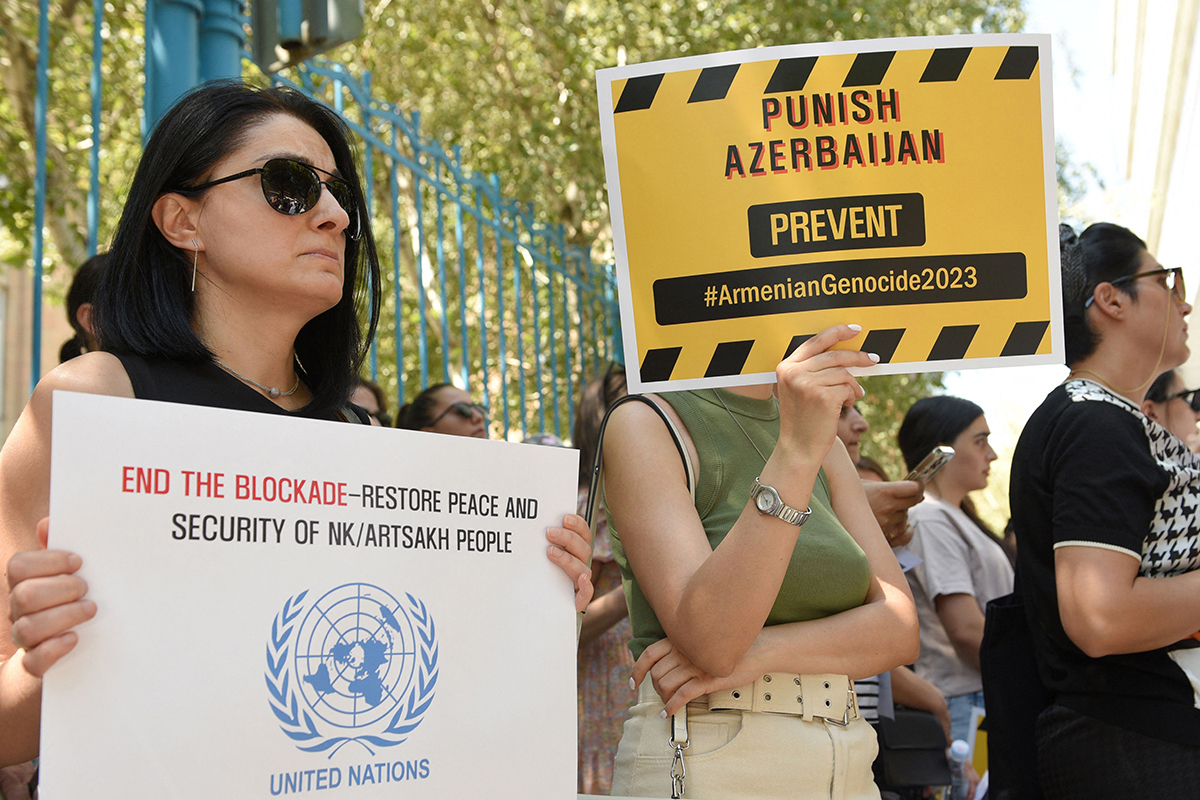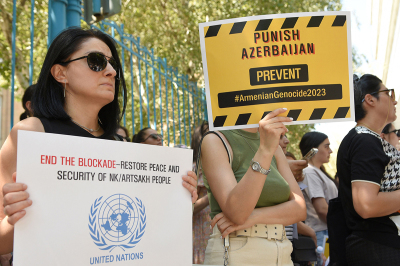No, Armenia is not anti-Semitic. But Azerbaijan certainly is


Last Friday, it was announced that Armenia has decided to officially recognize Palestine as an independent state. This news came as a shock to observers in Armenia, as the decision seemingly came out of the blue. Media outlets in Azerbaijan began spreading stories about Armenia’s blatant anti-Semitism, even though Azerbaijan has recognized Palestine as an independent state since the 1990s. While we can only speculate why Armenia chose this moment to recognize Palestine, it is possible that this was a prerequisite for the normalization of relations with Turkey and Azerbaijan, which has been gaining momentum recently.
In light of this announcement, perhaps the most pressing question is whether Armenia, the world’s first and oldest Christian country, is actually anti-Israel. While Armenia’s decision to recognize Palestine is concerning, it is important to note that it is literally the last country in the entire Middle East to do so, and it is likely due to external pressure. Armenia is an ancient biblical nation and certainly does not identify with the values of radical Islam.
Furthermore, according to Israel’s National Security Secretariat, Armenia is the safest country for Jews to travel to in the entire Middle East (outside Israel). In fact, it is safer than Azerbaijan and most of Western Europe. Likewise, Armenia has served as a safe haven for Jews seeking to escape persecution in Russia, so much so that the Jewish community goes out of its way to highlight this fact.
Frankly, Armenia has its concerns about Israel. First, it feels betrayed because Azerbaijan imports nearly 70% of its weapons from Israel. These weapons are routinely used against Armenians, including in the ethnic cleansing of 120,000 Armenian Christians from Artsakh. While Armenia recognizes and mourns the Holocaust, Israel does not recognize the Armenian genocide. While these things are frustrating, Armenians also understand that Israelis are not inherently anti-Armenian and that, like Armenians, they are trying to survive in an extremely hostile neighborhood.
While Armenians are busy fending off attacks from Azerbaijan, Israel is busy countering the Iranian threat. In fact, the Iranian threat is the pretext for the entire Israeli-Azerbaijani relationship. Azerbaijan’s proximity to Iran has made it a key base of operations for Israeli intelligence operations against Tehran. To be clear: Azerbaijan’s relationship with Israel is a matter of geopolitical calculation, not religious pluralism.
In addition to access to sophisticated Israeli weaponry, Azerbaijan also uses its relations with the Jews to create a façade of tolerance while waging a campaign of ethnic cleansing and genocide against the region’s Armenian Christians. For example, after the ethnic cleansing of Artsakh in 2023, which expelled 120,000 Christians from their ancient homeland, Baku reflexively pointed to its positive relations with the Jews as proof of its “tolerance” toward religious minorities.
A closer look at Azerbaijan’s relationship with Israel shows that it is manipulation, not genuine solidarity with the Jewish people. First, as mentioned above, Azerbaijan recognized Palestine as an independent state in the early 1990s, 30 years before Armenia recognized Palestine. Second, according to UN Watch, Azerbaijan has a 100 percent anti-Israel voting policy at the UN. For comparison, Azerbaijan has voted against Israel on 153 resolutions at the UN. This is hardly the behavior of a nation that loves the Jewish people.
It should also be noted that Azerbaijan’s closest ally, Turkey, remains a staunch supporter of Hamas. In fact, relations between Ankara and Baku are so close that the two presidents describe themselves as “one nation, two states.” Following the October 7 terrorist attacks on Israel, Azerbaijan’s foreign minister stated: “Azerbaijan supports the Palestinian people in their struggle for their own state, the solution of the Israeli-Palestinian conflict on the basis of the two-state principle with East Jerusalem as the capital of Palestine.”
Despite Azerbaijan’s anti-Semitic tendencies, the country knows it cannot afford to lose Israel as a strategic partner. For this reason, it is working hard to portray its main rival Armenia as anti-Semitic in order to isolate Yerevan from Israel. Shortly after Armenia announced it would recognize Palestine, Azerbaijan launched a media offensive to propagate its support for the Jewish people and denounce Armenia’s alleged anti-Semitism.
Unfortunately, it seems that Azerbaijan is even ready to take extreme measures to maintain the division between the Armenian and Jewish people. Since 2023, the Mordechai Navi Synagogue in Armenia has been vandalized four times. Interestingly, at least some of the incidents appear to have been perpetrated by non-Armenians who left the country immediately after the attack. Several members of Armenia’s Jewish community, including the Chief Rabbi of Armenia, publicly stated that they believe the attacks were instigated by foreign actors to portray Armenia as anti-Semitic. According to Roman Lapin, a member of the Jewish community, the attacks were “undoubtedly a provocation, the roots of which come not from the Armenian community, but from outside. This is evidenced by the fact that absolutely every attack was accompanied by external media pressure and used for Armenophobic propaganda, with details that were known to the attackers and to us, but were not published in the Armenian media.”
Although Armenia’s decision to recognize Palestine is troubling, it is not a sign of deeper anti-Semitism. Azerbaijan, which prides itself as one of Israel’s staunchest defenders, made the same decision 30 years ago. Armenia certainly has reservations about Israel, but that does not change the fact that it has been a safe haven for Jews in the Middle East. Nevertheless, Azerbaijan will continue to work diligently to portray Armenia as an enemy of the Jewish people in order to maintain its relations with Jerusalem. Let us hope the world can see behind the facade.
Dan Harre is the deputy director of Save Armenia: A Judeo-Christian Alliance. He is a graduate of the Robertson School of Government at Regent University, where he earned an MA in National Security Studies with a concentration in Middle East policy.




